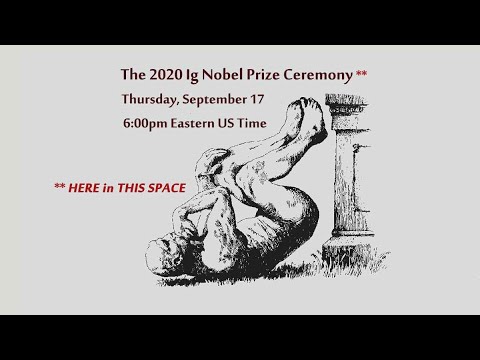
Ig Nobel Prize winners include scientists who cleared blocked noses with sex
Ig Nobel Prize winners include scientists who cleared blocked noses with sex



The winners of 2021’s Ig Nobel Prizes were announced on Thursday night, honouring scientists for their work in weird, funny, but ultimately intriguing science. One of the funniest awards on the scientific calendar, the annual Ig Nobel Prizes recognise “achievements that first make people laugh then make them think.” And then probably make them laugh again.
Last year’s winners included Indian and Pakistani diplomats who ding-dong ditched each other in the middle of the night (Peace Prize), scientists who tested knives made of human feces (Materials Science Prize), and various world leaders who demonstrated that politicians can have a greater impact on health than doctors (Medical Education Prize).
This year the 31st First Annual Ig Nobel Prize ceremony (not a typo) was again held via live stream due to the COVID-19 pandemic, though that definitely didn’t stop scientists from getting silly. In addition to the awards, the stream featured a series of 24/7 lectures wherein speakers had 27 seconds then seven words to convey their thoughts on a topic. There was also a bridge-themed “mini-opera,” because scientists like singing too.
But of course, the most important part of the night were the prize announcements. The winners of 2021’s Ig Nobel Prizes are:
Biology Prize: Susanne Schötz, for her work analysing communication between humans and cats. Schötz has spent years exploring the hypothesis that cats change their vocalisations somewhat deliberately to communicate different information in different situations.
Ecology Prize: Leila Satari, Alba Guillén, Àngela Vidal-Verdú, and Manuel Porcar, for collecting used chewing gum from pavements around the world and using genetic analysis to identify the bacteria in them. Gross, but it could be useful for forensics or disease control.
Chemistry Prize: Jörg Wicker, Nicolas Krauter, Bettina Derstroff, Christof Stönner, Efstratios Bourtsoukidis, Achim Edtbauer, Jochen Wulf, Thomas Klüpfel, Stefan Kramer, and Jonathan Williams, for testing the air inside movie theatres to see whether gases emitted by the audience can indicate the classification of the content being shown. Results haven’t been entirely reliable, but are still promising enough to warrant further investigation.
Economics Prize: Pavlo Blavatskyy, for his discovery of a potential correlation between obesity in politicians and the level of corruption in the countries they supposedly serve. Importantly, he noted this doesn’t imply that individual fat politicians are more corrupt than slim ones.
Medicine Prize: Olcay Cem Bulut, Dare Oladokun, Burkard Lippert, and Ralph Hohenberger, for testing the effectiveness of orgasms in improving nasal respiration. Spoiler alert: It turns out that a good climax can be as effective as a medical decongestant.
Peace Prize: Ethan Beseris, Steven Naleway, and David Carrier, for exploring the hypothesis that humans evolved facial hair as protection from getting socked in the jaw. It seems skin covered with thick hair absorbs more kinetic energy than shaved skin — though luxurious beards still won’t replace chin guards any time soon.
Physics Prize: Alessandro Corbetta, Jasper Meeusen, Chung-min Lee, Roberto Benzi, and Federico Toschi, for running experiments to find out why pedestrians don’t collide with each other all the time.
Kinetics Prize: Hisashi Murakami, Claudio Feliciani, Yuta Nishiyama, and Katsuhiro Nishinari, for running experiments to find out why pedestrians do collide with each other some of the time.
Entomology Prize: John Mulrennan, Jr., Roger Grothaus, Charles Hammond, and Jay Lamdin, for their study testing a new method of killing cockroaches on submarines. It’s an incredibly specific problem, but that doesn’t mean it doesn’t need answers.
Transportation Prize: Robin Radcliffe, Mark Jago, Peter Morkel, Estelle Morkel, Pierre du Preez, Piet Beytell, Birgit Kotting, Bakker Manuel, Jan Hendrik du Preez, Michele Miller, Julia Felippe, Stephen Parry, and Robin Gleed, for researching whether suspending sedated rhinos upside down in the air by their feet is worse for them than a more horizontal configuration. Surprisingly it’s actually slightly better for them, which is good news considering how many rhinos conservationists have transported like this.
Congratulations, you big nerdy weirdos.

